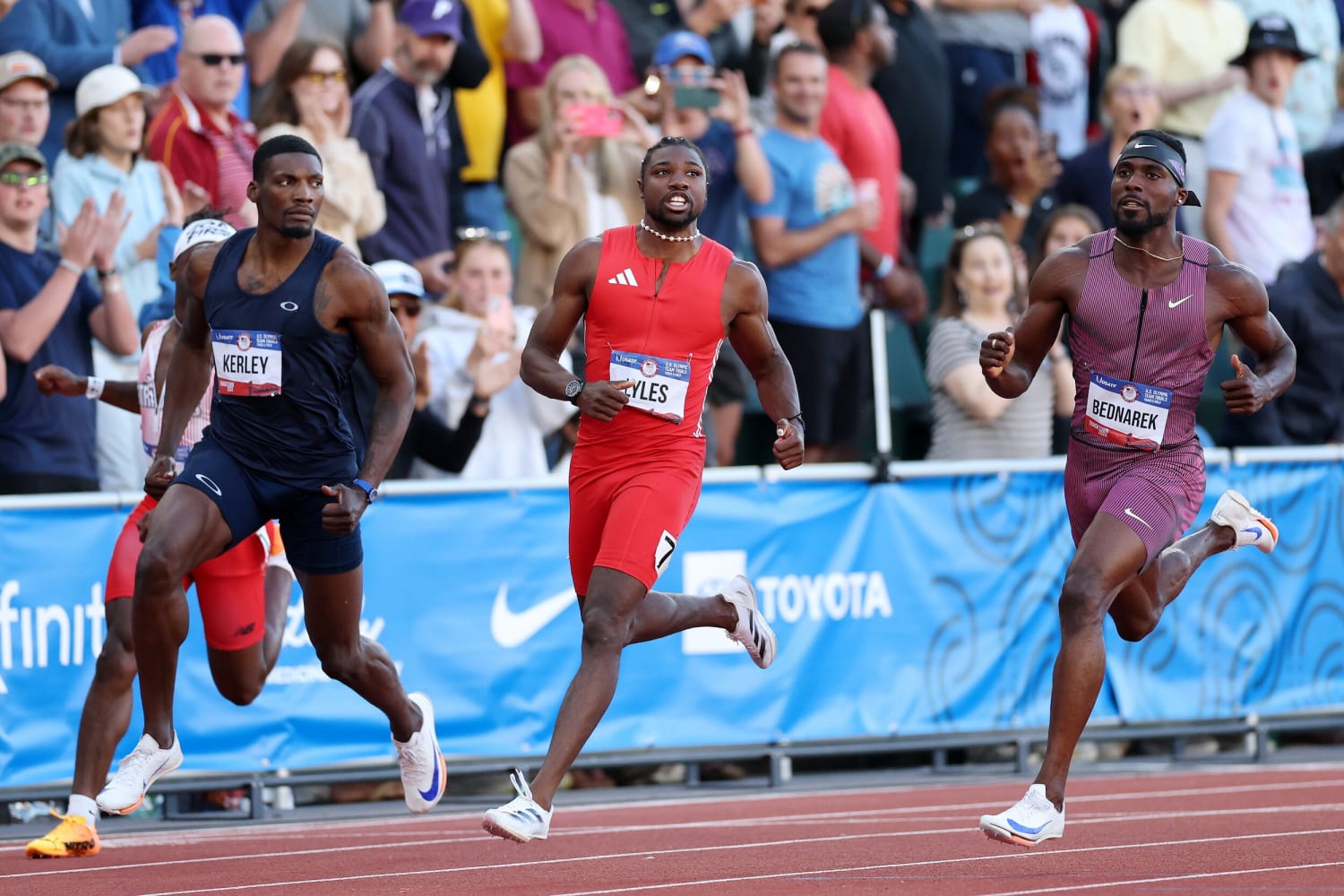The Stage is Set
On a vibrant August evening in 2024, the lilac track at Stade de France buzzed with anticipation. Noah Lyles, the charismatic American sprinter, stood poised to reclaim the Olympic men’s 100m title for the United States, a feat not accomplished since Justin Gatlin’s victory in 2004. The air was thick with expectation, as Lyles aimed to restore pride to US sprinting after years of Jamaican dominance led by the legendary Usain Bolt.
A Legacy of Speed
The Decline of American Sprinting
For over a decade, the men’s 100m had been a Jamaican stronghold, with Bolt’s electrifying performances casting a long shadow. The United States, once a sprinting powerhouse with icons like Carl Lewis and Maurice Greene, had struggled to keep pace. The 2024 Paris Olympics offered a chance to rewrite this narrative, and Lyles was the man to do it. His bold claim of being Bolt’s heir fueled both excitement and skepticism.
Noah Lyles: The Man Behind the Mission
Lyles, a 27-year-old from Gainesville, Florida, is no stranger to the spotlight. Known for his flamboyant style—think painted nails and anime-inspired celebrations—he’s a sprinter who thrives on personality as much as speed. His journey began at T.C. Williams High School, where he smashed records and earned accolades as the 2015 and 2016 high school boys’ athlete of the year by Track & Field News. Turning pro in 2016, Lyles signed with Adidas, bypassing college to chase global greatness.
The Road to Paris
Early Career Triumphs
Lyles’ ascent was meteoric. In 2014, he won gold in the 200m at the Youth Olympic Games. By 2016, he claimed double gold in the 100m and 4x100m relay at the World U20 Championships. His personal bests—9.81 in the 100m and an American record of 19.31 in the 200m—marked him as a serious contender. Yet, his unconvincing heat at the 2024 Olympics, marred by a sluggish start, raised eyebrows. Could he deliver under pressure?
The Weight of Expectations
The American sprinting community was reeling after Sha’Carri Richardson’s unexpected defeat in the women’s 100m to St. Lucia’s Julien Alfred the day before. Lyles carried the weight of a nation eager to reclaim its sprinting honor. His confidence, often bordering on brashness, was both his strength and a lightning rod for critics. “I’m the loudest voice in the room,” he once said, and he meant to prove it on the track.
The Race That Stopped the World
The Closest Finish in History
The men’s 100m final on August 4, 2024, was a spectacle for the ages. Eight sprinters, all breaking the 10-second barrier, made it the fastest Olympic 100m field ever. Lyles, in lane 7, faced fierce competition from Jamaica’s Kishane Thompson in lane 4, who had clocked a blistering 9.80 in the semifinals. The race was so tight that NBC announcer Leigh Diffey mistakenly called Thompson the winner. After a nail-biting 30-second wait, Lyles was declared the victor by a mere 0.005 seconds, with a personal best of 9.784 to Thompson’s 9.789.
Breaking Down the Race
Here’s how the top finishers stacked up:
| Rank | Athlete | Country | Time (s) | Notes |
|---|---|---|---|---|
| 1 | Noah Lyles | USA | 9.784 | Personal Best, Gold |
| 2 | Kishane Thompson | Jamaica | 9.789 | Silver |
| 3 | Fred Kerley | USA | 9.81 | Bronze |
| 4 | Akani Simbine | South Africa | 9.82 | National Record |
| 5 | Marcell Jacobs | Italy | 9.85 | Season’s Best |
The race was a testament to Lyles’ resilience. Trailing until the final strides, he surged forward with a perfectly timed dip at the line, edging out Thompson in what may be the closest 100m finish in Olympic history.
The Aftermath and Impact
A Moment of Redemption
Lyles’ victory was more than a personal triumph; it was a statement. The United States had not won Olympic 100m gold since 2004, and Lyles ended that 20-year drought. His teammate Fred Kerley’s bronze added to the American resurgence, with three US sprinters in the final—a feat not seen in decades. Lyles’ celebration, complete with his signature “Kamehameha” pose from Dragon Ball, lit up social media, cementing his status as a cultural icon.
Challenges and Controversy
Lyles’ journey wasn’t without hurdles. In the 200m, his stronger event, he took bronze behind Botswana’s Letsile Tebogo and teammate Kenny Bednarek. Shockingly, Lyles collapsed post-race, later revealing he had competed with COVID-19, diagnosed two days prior. His decision to race sparked debate, but his transparency about the illness humanized his struggle. “It affected my performance,” he admitted, yet his grit shone through.
Why Lyles’ Win Matters
Restoring American Pride
Lyles’ gold was a turning point for US sprinting. The sport had been vibrant, with American coaches training global stars, but Olympic gold had eluded the nation. Lyles’ victory, coupled with Kerley’s bronze, signaled a shift. It wasn’t just about speed; it was about swagger. Lyles’ bold persona—talking trash and backing it up—brought a new energy to the track, reminiscent of the sport’s golden era.
A Global Stage
The 100m is the Olympics’ marquee event, dubbed the “fastest man in the world” race. Lyles’ win placed him alongside legends like Jesse Owens and Usain Bolt. His ability to perform under pressure, despite a slow start and fierce competition, showcased his mental toughness. As he said, “Knowing that somebody could pop up fuels me.” That drive defined his Olympic triumph.
Comparing Lyles to His Predecessors
Lyles vs. Bolt: A Fair Comparison?
Lyles has long claimed to be Bolt’s heir, a bold statement given Bolt’s three consecutive Olympic 100m titles from 2008 to 2016. Let’s break it down:
- Speed: Bolt’s world record of 9.58 seconds remains untouchable, but Lyles’ 9.784 is a personal best and among the fastest ever.
- Charisma: Both are showmen. Bolt’s lightning bolt pose and Lyles’ anime-inspired flair captivate audiences.
- Legacy: Bolt’s eight Olympic golds dwarf Lyles’ single gold and two bronzes, but at 27, Lyles has time to build his resume.
While Lyles isn’t Bolt yet, his 2024 performance suggests he’s on the path to greatness.
Lyles vs. Gatlin: The Last American Champion
Justin Gatlin’s 2004 win was a high point for US sprinting, but his career was marred by doping controversies. Lyles, by contrast, represents a clean, vibrant future. Here’s a comparison:
| Aspect | Noah Lyles (2024) | Justin Gatlin (2004) |
|---|---|---|
| Winning Time | 9.784 seconds | 9.85 seconds |
| Margin of Victory | 0.005 seconds | 0.01 seconds |
| Public Persona | Charismatic, media-savvy | Reserved, later controversial |
| Olympic Medals | 1 Gold, 2 Bronzes (as of 2024) | 1 Gold, 2 Silvers, 2 Bronzes |
Lyles’ victory was tighter and faster, reflecting the sport’s evolution. His clean record and engaging personality make him a stronger ambassador for US sprinting.
Pros and Cons of Lyles’ Approach
Pros
- Confidence: Lyles’ bold demeanor motivates teammates and energizes fans.
- Versatility: Excelling in both 100m and 200m makes him a rare talent.
- Marketability: His flair draws sponsorships and media attention, boosting the sport’s visibility.
- Resilience: Competing with COVID-19 showed his determination, even if controversial.
Cons
- Risk of Overconfidence: His brashness can alienate competitors and fans, as seen in his semifinal stare-down with Oblique Seville.
- Health Risks: Racing while ill raised questions about judgment and safety.
- Pressure: High expectations can lead to burnout, especially with the 100m/200m double.
People Also Ask (PAA)
Who won the men’s 100m at the 2024 Olympics?
Noah Lyles of the United States won the men’s 100m at the 2024 Paris Olympics with a time of 9.784 seconds, edging out Jamaica’s Kishane Thompson by 0.005 seconds.
How fast was Noah Lyles’ 100m time?
Lyles ran a personal best of 9.784 seconds in the 100m final, making it one of the closest and fastest Olympic races ever.
Why was Lyles’ win significant for the US?
Lyles’ victory ended a 20-year drought for American men in the Olympic 100m, restoring national pride after years of Jamaican dominance.
Did Noah Lyles compete in other events?
Yes, Lyles won bronze in the 200m but withdrew from the 4x100m and 4x400m relays due to a COVID-19 diagnosis.
How to Follow Lyles’ Journey
Where to Watch Highlights
Missed the race? You can catch highlights on platforms like:
- NBC Sports: Offers full race replays and interviews.
- Olympics.com: Official results and video clips.
- YouTube: Search for “Noah Lyles 100m 2024” for fan-uploaded footage.
Stay Updated on Lyles
Follow Lyles on social media for real-time updates:
- X: @LylesNoah for race updates and his signature humor.
- Instagram: @nojo18 for behind-the-scenes content.
Best Tools for Track Fans
To dive deeper into sprinting:
- World Athletics App: Live results and athlete profiles.
- FloTrack: In-depth coverage of track events.
- Strava: Track your own runs and compare with pros.
The Bigger Picture
The Future of US Sprinting
Lyles’ win is a spark for the next generation. With talents like Fred Kerley and Kenny Bednarek, the US is rebuilding its sprinting dynasty. Programs like USA Track & Field’s development camps and college scholarships continue to nurture talent, attracting global athletes to American coaches.
Lyles’ Cultural Impact
Beyond the track, Lyles is a cultural force. His Netflix docuseries Sprint introduced fans to his journey, while his anime-inspired celebrations resonate with younger audiences. He’s not just running races; he’s redefining what it means to be a track star in the digital age.
FAQ
How did Noah Lyles prepare for the 2024 Olympics?
Lyles trained under coach Lance Brauman, focusing on speed endurance and mental toughness. His regimen included high-intensity sprints, strength training, and visualization techniques to handle pressure.
What challenges did Lyles face in Paris?
Lyles battled a slow start in the 100m heats and a COVID-19 diagnosis before the 200m, which impacted his performance. His mental resilience was key to his success.
How does Lyles compare to Usain Bolt?
While Lyles’ times are slower than Bolt’s records, his charisma and versatility draw parallels. At 27, he has years to chase Bolt’s legacy.
Where can I learn more about sprinting?
Check out World Athletics (worldathletics.org) for rules, records, and events, or watch Sprint on Netflix for a behind-the-scenes look at top sprinters.
What’s next for Noah Lyles?
Lyles aims to compete in the 2025 World Championships and continue his quest for the 100m/200m double at future Olympics.
A Personal Reflection
I’ll never forget watching Lyles’ race on TV, heart pounding as the photo finish flashed on the screen. It reminded me of my high school track days, where every millisecond felt like an eternity. Lyles’ victory wasn’t just about speed; it was about belief—something we can all relate to when chasing our own goals. His story is a reminder that greatness comes from daring to dream big, even when the odds seem stacked against you.
Conclusion
Noah Lyles’ 100m triumph at the 2024 Paris Olympics was a defining moment for US sprinting. His razor-thin victory over Kishane Thompson, coupled with his larger-than-life persona, breathed new life into a sport desperate for a hero. As Lyles continues to run, both on the track and in the cultural spotlight, he’s not just rescuing American sprinting’s honor—he’s redefining it for a new era. Whether you’re a track enthusiast or a casual fan, Lyles’ story is one of grit, glory, and the relentless pursuit of greatness.





